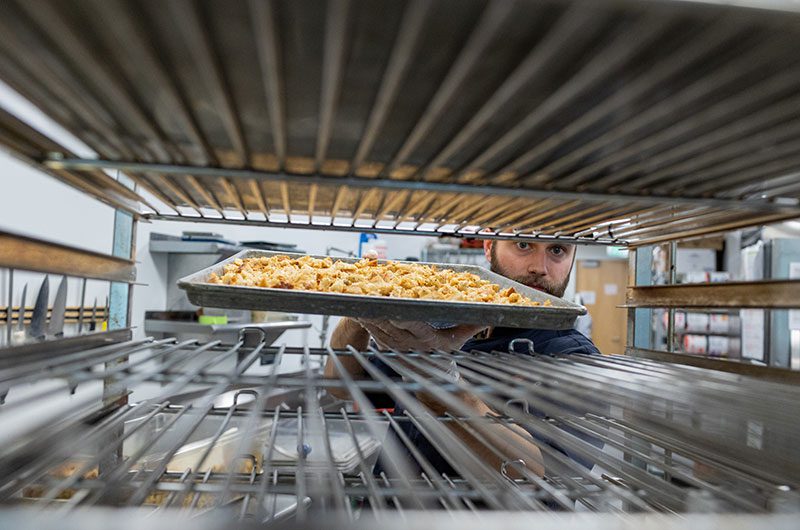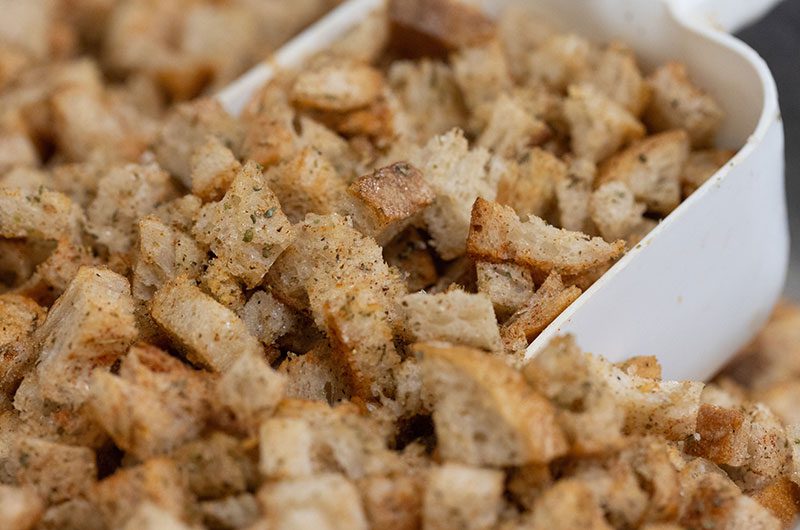FareStart’s Mighty Croutons – A Recipe for Change
by Rebekah Denn, photos by Meryl Schenker
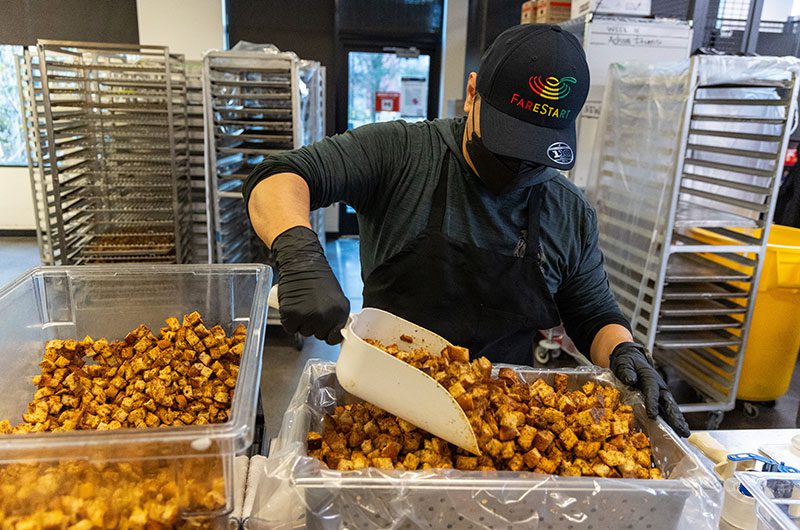
Behind every savory, crunchy FareStart crouton is a partnership between three essential Northwest companies.
FareStart’s “Mighty Croutons” — originally available in PCC’s salad bars, now packaged for home use and sold at all PCC stores — are made with unsold loaves of Macrina bakery bread, transformed into croutons in FareStart’s Interbay kitchen. FareStart, a James Beard Award-winning nonprofit, is devoted to food security and to culinary job training for people dealing with poverty, homelessness and other employment barriers.
After years of development and a pandemic interruption, the croutons became a delicious, paprika-and-marjoram-scented solution to several issues. The key challenge: “There’s so much food waste out there but also so much hunger,” said Corissa Helm, a FareStart marketing manager.
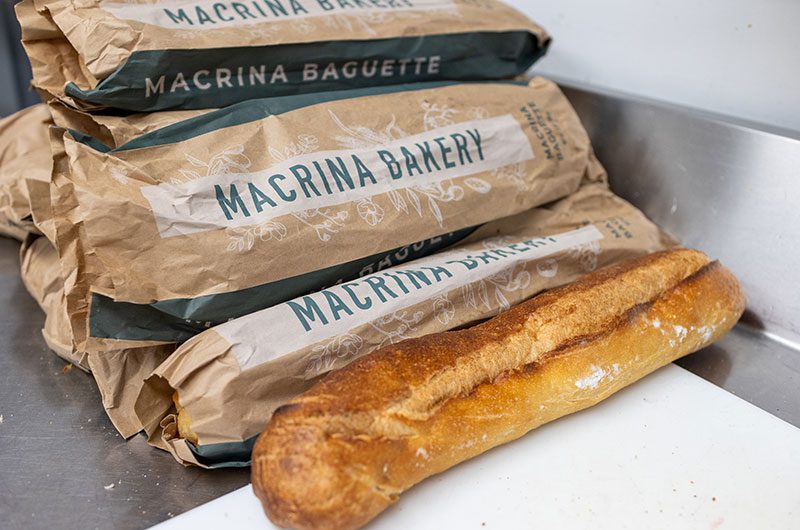
Developing a crouton
Croutons are simple to make at one level: Cube crusty day-old bread, toss it in oil and spices, and bake until crunchy. Home bakers typically make croutons to avoid wasting leftover loaves.
Leftover takes on a different scale at grocery stores, which try to generously stock bread and avoid disappointing shoppers with empty shelves — without wasting either money or food. Stocking bread is an imprecise day-to-day science that sometimes means extra loaves at the end of the day, especially with items like artisan breads that have a short shelf life.
The crouton idea was first baked up when Leslie Mackie, who founded Macrina in 1993 and saw it rise to countless national best-of bakery lists, met Rachel Tefft, PCC’s manager of community food systems. They connected in 2019 at a Seattle Public Utilities meeting devoted to reducing food waste.
While PCC donates regularly to local food banks, many can’t use a regular stream of crusty bakery baguettes and boules. It’s hard to distribute those breads before they become unusably stale, and many recipients prefer longer-lived, already-sliced sandwich breads anyway.
Mackie and Macrina’s staff agreed to pick up specific day-old breads from PCC stores and keep them in their freezers to preserve quality until FareStart’s twice-weekly pickups. FareStart culinary staff and students worked on developing a crouton recipe that scored high on taste, was cost-efficient and met PCC’s quality standards for ingredients.
As Sound Consumer reported at the time, FareStart and PCC went through different iterations of size, spice mixes, and “profile” types, aiming for a crouton that was tasty on its own but also neutral enough to use in a variety of dishes. The project was a case study for the Pacific Coast Food Waste Commitment, a public-private partnership committed to reducing food waste across the region by 50% by 2030.
Compounding the practical difficulties, the COVID-19 pandemic caused both supply chain disruptions and significant changes to FareStart operations, altering its training programs and its services.
“If this were easy, it would have been done a long time ago,” PCC Fresh Director Tracy Marik said at the time.
Finally, though, it was complete.
FareStart received necessary state approvals to process food that could be sold in other locations, said Nathan Heartman, director of contract meals, who joined the project. The croutons began as an option in PCC salad bars, then recently progressed to being packaged for retail sale at all stores.
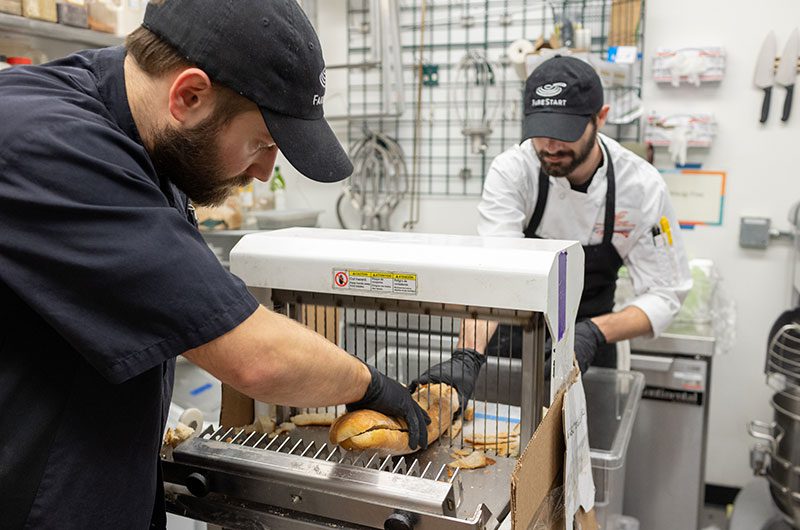
Crouton recipe for success
On a recent weekday, the process was at full power.
Macrina’s organic baguette, batard and Giuseppe loaves are considered to have a one-day shelf life, Mackie said. Any unsold loaves of those breads at PCC’s 15 stores are set aside for FareStart, and Macrina drivers retrieve them on their daily delivery runs and store them in an isolated freezer, with FareStart making twice-weekly pickups from Macrina’s Kent facilities. The process was carefully planned to avoid increased use of fossil fuels. In just one recent week, 300 pounds of bread made its way to the crouton freezers — with no added mileage.
Cutting food waste is “a really important factor to all of us,” Mackie said. Macrina has invested in new equipment in recent years to cut down on waste like extra bits of raw dough, but the crouton project seemed like a wonderful addition.
Macrina bakes an extra “buffer” of breads each day as a sort of insurance policy in case it needs to accommodate quality issues like, for instance, a burned loaf. Extras from that buffer, or unsold items from cafes, are often donated to different nonprofits. If not appropriate for those uses, it might be used for other purposes, like commodity animal feed. But upcycled croutons seemed like a better destination. “If there’s any possible way we can (have) it going to benefit another human being, it’s our commitment to be able to do that,” Mackie said.
“I think we all know the magic of leverage. When we can help out a little bit, and PCC helps out a little bit, and then FareStart helps out a little bit, it just benefits everyone.”
In the FareStart kitchen, workers including lead cook Kyle Martello, trainees, and volunteer Evan Gaebler, a graduate of FareStart’s training program who regularly returns to help out, worked through stacked loaves of crusty breads. They halved baguette after baguette on an industrial slicers and then swiftly cubed the rest by hand. The process is labor-intensive, but results in a rustic-looking crouton with hands-on attention to seasoning, doneness and other quality controls.
Kitchen Supervisor Robert Franklin coated 36-pound bins of the cubes in safflower oil and added a cloud of mixed spices, including granulated garlic, black pepper, paprika and marjoram. Then trays of the savory cubes headed into convection ovens for a long, low-temperature drying process under a high-speed fan. Franklin kept an eye out and tested the occasional cube for the magic endpoint of color and crunch. “It gets basically dehydrated,” Heartman said, so that the crisp end result has a long shelf life.
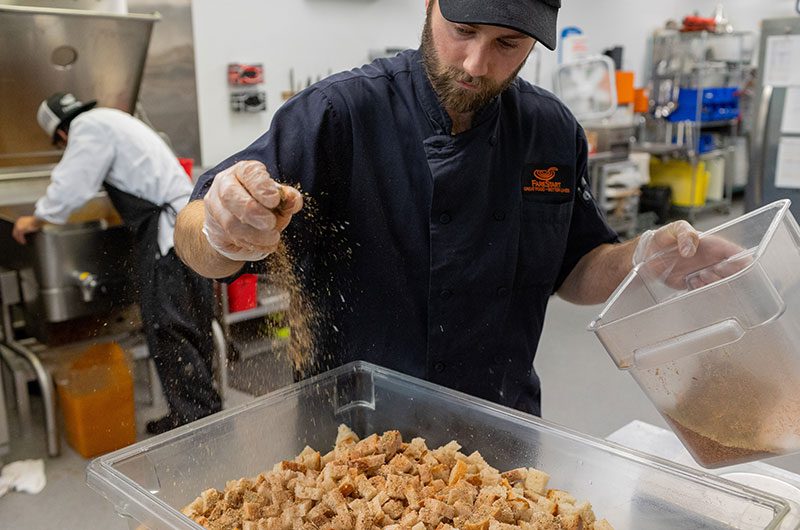
Upcycled foods
Croutons are the first step in what could be a larger line of upcycled products from FareStart, Heartman noted. That’s an increasingly popular take on an old-fashioned concept: Preventing food waste by making more good food out of ingredients that would otherwise be discarded. That’s important not just to fight hunger and prevent waste, but because food waste is an enormous contributor to harmful greenhouse gas emissions.
In one in-house example, FareStart recently partnered with the nonprofit City Fruit to process apples from neighborhood trees and orchards, turning them into applesauce for meals made for local nonprofits and schools, rather than purchasing single-serve commercial containers. That’s another hands-on, labor-intensive project.
While such projects save food waste and potentially generate money, the main purpose goes to the heart of FareStart’s mission, Heartman said. For more than 30 years, the organization has helped people address the root causes of poverty and food insecurity, in this case literally through creating food. In 2025, nearly 200 FareStart students are expected to support crouton production.
“Our goal is to provide a training ground,” Heartman said.
